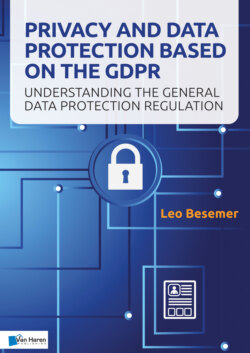Читать книгу Privacy and Data Protection based on the GDPR - Leo Besemer - Страница 12
На сайте Литреса книга снята с продажи.
1.1 The history of privacy and data protection
ОглавлениеAt the time our distant ancestors lived as nomads, privacy was not an issue. In fact, it was in the group’s interest to stay close at all times, to hunt together, to look out for the group and help defend it, to share food, shelter and indeed body warmth. Knowing each other intimately was important, both because of the need to trust each other’s skills and to be aware of hostile intentions, such as the continuous struggle for leadership of the group. In those circumstances, seeking isolation would be seeking danger and being banned from the group would almost certainly lead to death.
This lack of personal privacy did not really change in the ages thereafter. Poor people had little or no privacy, either because they were not free (slaves, serfs, servants, etc.) or because they lived closely together in settlements or neighborhoods where the same need for mutual help and support still existed. But the rich had hardly any privacy either, because the habits and the necessity of security required the continuous presence of many staff. Seclusion was seen as abnormal behavior. The view was that you would only seek it if you had something to hide. Only if you wanted to do something that could not bear the light of day.
The need for privacy as we know it today came up for the first time at the end of the 19th century, when newspapers appeared with extensive society pages, taking gossip to a new level. The announcement on 22 October 1882 of the engagement of Mr. Samuel D. Warren Jr. and Miss. Mabel Bayard, was a kind of starting point. Samuel Warren was a young lawyer from Boston, USA, and as such not used to being the subject of newspaper headlines. His fiancée, however, was a daughter of Senator Bayard and what we today would call a celebrity. Over the following decade, more than sixty newspaper articles appeared, describing down to the smallest detail their social life, their marriage, their family’s highlights and sad events. (Gaida 2008).
The continuing intrusive press coverage ultimately lead to an article in Harvard Law Review, written by Louis D. Brandeis and Samuel D. Warren Jr. (Brandeis 1890), which is widely regarded as the first publication in the United States to advocate a right to privacy.
“The press is overstepping in every direction the obvious bounds of propriety and of decency. Gossip is no longer the resource of the idle and of the vicious, but has become a trade, which is pursued with industry as well as effrontery. To satisfy a prurient taste the details of sexual relations are spread broadcast in the columns of the daily papers. To occupy the indolent, column upon column is filled with idle gossip, which can only be procured by intrusion upon the domestic circle.” (…)
“Recent inventions and business methods call attention to the next step which must be taken for the protection of the person, and for securing to the individual what Judge Cooley calls the right ‘to be let alone.’”
“Instantaneous photographs and newspaper enterprise have invaded the sacred precincts of private and domestic life; and numerous mechanical devices threaten to make good the prediction that what is whispered in the closet shall be proclaimed from the house-tops. (…)”
Source: (Brandeis, 1890)
In the article Warren and Brandeis advocate the necessity of law enforcing this right to be let alone and describe its boundaries as an extension of the then existing common law. At that time privacy was thought of as a relational matter, only existing in the context of home and family. At first, however, this desire to control personal information and social image, and the plea for a legal system to protect these rights, did not get much attention.
Up to and directly after World War II, state constitutions protected only aspects of privacy. Such guarantees concerned, for example, the inviolability of the home and of correspondence and the classical problem of unreasonable searches of the body. No state constitution, however, contained a general guarantee of the right to privacy. An integral guarantee protecting the more specific aspects of privacy and private life in their entirety, was unknown at the time.
